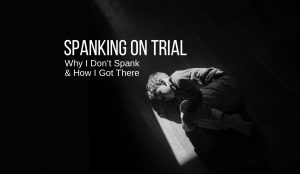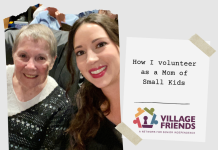I had jury duty last year. During voir dire, we were all seated in a courtroom with our juror numbers printed on a half-sheet of bright orange paper that we held up to answer affirmatively to the questions asked by the attorneys. The charges in the case were child abuse, so some of the questions asked were about our opinions of acceptable parenting practices. The questioning went on for a couple of hours. Then the prosecutor asked whether anyone believed that it was never okay to spank a child. I held up my number card. I looked around with surprise and then growing trepidation as I realized that I was the only one in a room full of people holding up a card. The prosecutor looked at my number and then scanned his list until he found my name. “Mrs… Savage. You believe that it’s never okay to spank a child?” Every head in the room simultaneously turned around to look at me, and a woman in the front row dropped her mouth open in surprise and started whispering to the person next to her. I truly wish I were exaggerating. It was a scene in a movie I did NOT sign up to be in. Needless to say, I was not selected to be on the jury.
 I assumed my opinions on spanking were in the minority in this area of the South, but that day confirmed it.
I assumed my opinions on spanking were in the minority in this area of the South, but that day confirmed it.
My parents spanked my brothers and I growing up. My husband’s family did the same. I know and love lots of people who were spanked as children or who spanked their children. They’re all good parents. So when my daughter was a toddler and began testing boundaries, I spanked her bottom a few times. It felt wrong. It made me sick to my stomach. I quickly realized that every time I resorted to spanking it was because I felt like I had no other options. I had run out of tools in my parenting toolbox and felt angry and out of control. I didn’t want to keep doing it. As I often do when confronting a parenting issue, I wanted to see what the research said. As it turns out, no studies have ever shown that physical punishment, including spanking, has any long-term positive effects, and many studies show negative effects including depression, anxiety, aggression, and mental health issues. A study published last year even showed that spanking alters children’s brain function in response to environmental threats. Meta-analyses (a way of combining multiple scientific studies of a single research topic) show that at BEST, spanking is neutral, but at worst, it’s harmful.
That research was enough to make me decide a few years ago that I was done with physical punishment, but after becoming a spectacle at jury duty, I wanted to be able to really articulate my position on spanking. So here it is.
First, I think it’s important to define our terms. When I use the word “spank,” I’m referring to hitting a child with an open hand or object like a wooden spoon or belt on some part of their body (typically bottom, legs, or hands) as punishment for an undesirable behavior, to stop a current behavior, and/or deter the behavior in the future. I know some people may object to the word “hitting,” but I honestly don’t know how else to describe it accurately. I’ve heard “swatting” and “popping,” but what do those words mean if not using force against someone else’s body? It’s certainly not a gentle pat. Whichever way you slice it, the goal is physical pain to control behavior. And for that reason, it may be effective in the short term. Spanking will typically stop the behavior in the moment because it shocks the child enough to get them to freeze up out of fear and pain. It also may deter the behavior in the future through fear of that pain, in a learning process called operant conditioning.
So next we need to examine our goals. Why are we spanking our kids? Because we want to stop behaviors we don’t like. Because we want them to behave in a certain way. And because we are scared that if we don’t stop these undesirable behaviors now, they will impede our larger parenting goals of raising children who are happy, healthy, and responsible adults. We are scared that our kids will grow up to be disrespectful, poorly-mannered troublemakers if we don’t punish them. The irony is that spanking doesn’t actually teach our children to behave better, it just teaches them to avoid getting caught and may actually make their behavior worse. Spanking teaches fear and pain, not love and respect.
 I think most people spank as a form of punishment because they were spanked as children. They’re doing what was modeled for them. They may think that because they were spanked and they turned out fine, it’ll be fine to spank their kids. Or maybe they start out thinking they don’t want to spank their kids, but when they get to the end of their parenting rope like I did, they resort to spanking because they don’t know what else to do. Some people think you can’t properly raise children without spanking them. I’ve heard people say there is justification or even mandates for corporal punishment in the Bible (there’s not, but more on that later).
I think most people spank as a form of punishment because they were spanked as children. They’re doing what was modeled for them. They may think that because they were spanked and they turned out fine, it’ll be fine to spank their kids. Or maybe they start out thinking they don’t want to spank their kids, but when they get to the end of their parenting rope like I did, they resort to spanking because they don’t know what else to do. Some people think you can’t properly raise children without spanking them. I’ve heard people say there is justification or even mandates for corporal punishment in the Bible (there’s not, but more on that later).
If you read my article about Santa Claus, this next bit is going to sound familiar. We are our children’s protectors, teachers, and comforters. For the first few years of our children’s lives, we are their whole world. Infants believe that they are part of their mothers, that they and their mother are one unit, not separate beings. Establishing and maintaining a secure attachment with our kids is crucial for their emotional development. As they grow into their individual selves, they naturally test boundaries in pursuit of independence. We are there to provide the guardrails during their exploration. And what are some of the first guardrails we set when they become old enough to start testing boundaries?
Don’t touch the dangerous/gross things.
Don’t bite/kick/push people or animals.
Don’t hit.
How are we supposed to enforce our rule of not hitting someone else if we are hitting our children when they behave in a way that we don’t like? I promise you this contradiction between our words and actions is not lost on children. Adults may be able to perform the mental gymnastics it takes to distinguish spanking as a form of “loving” punishment from hitting a kid who annoyed you on the playground, but children cannot. They hear their parents say “Don’t hit Johnny” and then watch as their parents hit them when they don’t listen. We all know our kids mimic our behavior and learn more from watching us than listening to us. Kids are learning from their very first teachers and guides that hitting others is acceptable in certain circumstances. They’re also being told that they are being hit because their parents love them. Pain = love. If that is not the lesson you want them learning, then spanking has to be reevaluated.
There is a concept in psychology called cognitive dissonance. It happens when our mind and our behavior are in conflict, and it causes a lot of discomfort. Often, it’s easier to change our opinions than it is to change our behaviors, so we change our opinions. An easy example is cheating. Most people would agree that cheating on a test is wrong. But you’re really stressed, and the answers are right there online! Your mind says cheating is wrong, but you just did it anyway. Now you’re uncomfortable. You feel a little off, a little guilty. To assuage that feeling, you find reasons to justify it. This last year has been really hard. Everyone does it. If the teacher was that worried about it, they’d be more careful with their test questions. No one will find out. Cheating in general is wrong, but what I did was okay this time. Behavior didn’t match mind, so change mind to match behavior – cognitive dissonance resolved.
I would argue the same happens when we spank our children. We know that hitting is wrong. We teach our children that it’s wrong. But then we spank them because we don’t know what else to do. So we justify it. We use softer words like “pop” and “swat” to reframe the act in our heads. We tell ourselves that there is a difference. That since we as parents know the distinction, our children will too. We use survivorship bias – “I was spanked as a child, and I turned out fine!” We even bring the Bible into it and quote Proverbs 13:24 about sparing the rod. Another position I’ve heard is that different things work for different kids, and some kids respond well to spanking and that’s what they need.
Let’s tackle a few of these justifications.
Reframing spanking from hitting to “popping” or “swatting” may make us feel better, but it doesn’t change the reality. If I hit my husband when he forgets to take out the trash or leaves his dirty socks on the floor for the millionth time, that’s domestic violence. If I hit an elderly relative I’m caring for because they spilled something, that’s elder abuse. If I hit a stranger because they cut in line at Kroger, that’s a crime. But if I hit my minor child on their bottom? I’m just disciplining them, says the U.S. legal system, no problem. Riddle me that.
Survivorship bias is a logical error we make when we focus on the examples of people who made it through something, while forgetting those who didn’t because they’re either not around or not as visible. People use it all the time. “Back in my day, we never used car seats, and my kids are all perfectly fine!” Well, yes, thankfully you never got in a car accident. But that doesn’t mean that car seats aren’t the safest option for children. Just because you or your kids were fine after being spanked, does not mean that no one has ever been hurt by spanking or that spanking is a safe option. As author Sheila Wray Gregoire puts it, if you turned out fine, it’s “DESPITE spanking, not BECAUSE of it.”
The phrase “spare the rod, spoil the child” is not in the Bible; it’s a perversion of Proverbs 13:24 that comes from a satirical 17th century poem called Hudibras by Samuel Butler. The actual verse, and that section of Proverbs, is referring to how parents should teach children right from wrong and show them how to live well. Shepherds used their rods to correct their sheep and protect them against predators. It’s a metaphor about discipline, not a literal directive to beat children. For a more in depth discussion about that verse, this is a great article.
And lastly, I’ve heard people say that kids are different, and some respond well, or even need, spanking. To those people, I’d like to ask which type of kid is the prime candidate for spanking? The type who was only spanked once and then the mere threat of a spanking would make them behave (like I was as a child)? If that’s all it took, then I’m almost positive those kids would also respond to other methods of discipline like natural consequences. Or is it the type who won’t respond to anything but spanking and whose behavior only escalates? In that case, I can’t help but wonder whether spanking is contributing to the behavior rather than curbing it, as twin studies seem to suggest.
 Okay, so what now? When I decided that spanking my children would no longer be an option for me, I still needed an alternative. Quite frankly, spanking is the easy option. Growing as a person, uncovering personal trauma and doing the work to heal, learning to process your emotions and control your own behavior, and finding new parenting methods and implementing them in your daily life is hard. That takes considerable time, effort, and attention. Thankfully, I found the work of Janet Lansbury and was able to start using her methods of respectful parenting. I no longer feel like I ever need to spank because I have plenty of other options, like using natural consequences, acknowledging feelings, and focusing on the relationship with my kids. I’ve noticed a huge change in my daughter since I began using respectful parenting techniques, and my choice to not spank is reaffirmed on the occasions I get overwhelmed and my words or demeanor become harsh. My harsh tone unnerves her, and she reacts by acting out more, not less. I frequently pray that God will protect my children from my mistakes and ignorance, and I believe that my daughter will not experience negative effects from the few times that she was spanked as a toddler.
Okay, so what now? When I decided that spanking my children would no longer be an option for me, I still needed an alternative. Quite frankly, spanking is the easy option. Growing as a person, uncovering personal trauma and doing the work to heal, learning to process your emotions and control your own behavior, and finding new parenting methods and implementing them in your daily life is hard. That takes considerable time, effort, and attention. Thankfully, I found the work of Janet Lansbury and was able to start using her methods of respectful parenting. I no longer feel like I ever need to spank because I have plenty of other options, like using natural consequences, acknowledging feelings, and focusing on the relationship with my kids. I’ve noticed a huge change in my daughter since I began using respectful parenting techniques, and my choice to not spank is reaffirmed on the occasions I get overwhelmed and my words or demeanor become harsh. My harsh tone unnerves her, and she reacts by acting out more, not less. I frequently pray that God will protect my children from my mistakes and ignorance, and I believe that my daughter will not experience negative effects from the few times that she was spanked as a toddler.
I’m not the parenting police. Ain’t nobody got time for that. It is possible to be against spanking as a concept without being against the people who practice it. The idea of “hate the sin, love the sinner” if you’re a Christian. I don’t think hitting kids should be a method of punishment, but that does not mean that I’m sitting on a high horse in judgment of everyone around me who does. But if you’re like me and realizing that spanking was just something you’re doing because everyone else around you is, and you’re not feeling all that great about it, I urge you to listen to that feeling. It may be time to take an objective look at spanking and your own motivations for doing it. It takes a lot of courage and character to examine your own beliefs and actions and decide to make a change. If that’s you, feel free to reach out. I’d love to support and encourage you.











